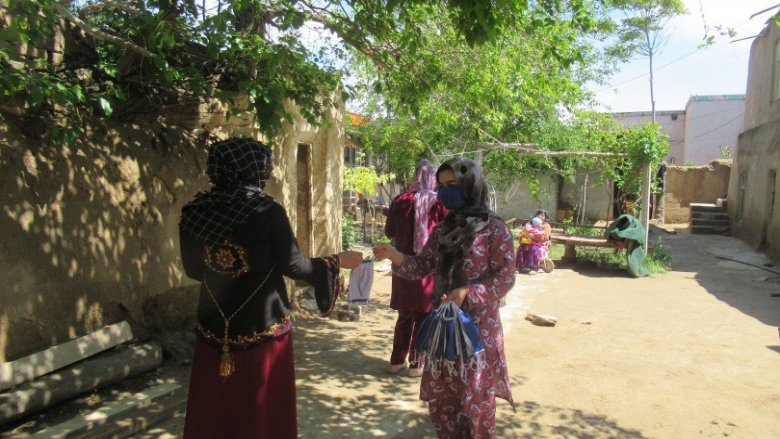
Story Highlights:
- Afghanistan has redeployed two leading development programs to promote health recommendations to fight COVID-19 in thousands of rural and urban communities.
- Awareness campaigns have helped dispel misinformation about the coronavirus while promoting precautionary measures like frequent hand washing and wearing masks.
- In several Afghan provinces, women who attended awareness sessions have turned to producing masks for their communities to help prevent COVID-19 outbreaks.
Masooma (name changed) sews about 100 masks a day to help prevent the coronavirus (COVID-19) from spreading in her hometown of about 1,700 people located in northern Afghanistan’s Jawzjan province.
The 24-year-old woman is part of a growing cohort of women across Afghanistan who have turned to producing masks to meet the demand triggered by the threat of the virus in their communities. What convinced Masooma to take action is an awareness campaign about the coronavirus that the Citizens’ Charter, Afghanistan’s flagship development program, organized in her village.
“During the campaign, we learned that we had to take the danger of the coronavirus seriously,” she says. “One of the ways to protect against and combat this deadly contagious disease is wearing masks.”
When they realized that masks were in short supply, Masooma and four other villagers decided to sew and give away masks to residents in the village. So far, she has distributed nearly 1,000 masks to neighbors and villagers who cannot afford to buy protective equipment. Masooma now intends to train more women in the village to stitch and sew their way to helping defeat the coronavirus.
COVID-19 has hit Afghanistan hard. The last official tally reported around 30,000 COVID-19 cases and over 600 deaths. Low education levels’ limited access to information, water and sanitation; and a weak health system make it difficult for the country to control the rapid spread of the virus. The government of Afghanistan has redeployed two key development programs to curb the impact of the virus in rural and urban communities.
The Citizens’ Charter and the Women’s Economic Empowerment – Rural Development Project (WEE-RDP) are at the forefront of running public awareness campaigns in rural areas. The Independent Directorate of Local Governance is responsible for the Charter’s campaigns in cities and urban areas.
"During the campaign we learnt that we had to take the danger of the coronavirus seriously."
- Deputy chairperson, Nakarabad Community Development Council, Jawzjan province
Disseminating life-saving messages
The campaigns have helped dispel misinformation while promoting health recommendations and medical guidelines set by the Ministry of Public Health. People are encouraged to wash hands frequently, use antiseptics to clean household items, wear masks in public places, avoid meeting people with colds and coughs, observe physical distance, avoid crowded places, and stay home as much as possible.
Masooma, who is deputy chair of the Nakarabad Community Development Council (CDC), was invited to attend the local public awareness sessions. So far, the Citizen’s Charter has held meetings for Councils members and mullahs in some 12,000 communities in 124 districts across Afghanistan.
In turn, village leaders share this life-saving information with the rest of their community during small gatherings, where attendees observe strict social distancing and other prevention measures. Mullahs also disseminate messages through mosque loudspeakers to reach all residents.
“We have communicated to people to refrain from shaking hands, kissing, and hugging for the safety of their loved ones, family members, and the broader community, as these measures will help us defeat this global pandemic,” says the head of the neighborhood council in Mazar-e-Sharif, a city in the Balkh province.
The head also reports that his fellow council members have sprayed their mosques and neighborhoods with disinfectant, distributed sanitation packages, and raised awareness about self-quarantine and social distancing.
Another program, WEE-RDP, which helps empower poor rural women, has sent female staff to villages and individual homes to deliver prevention guidelines, especially to residents with no access to the media. So far, women canvassers have reached over 4,000 self-help groups in Balkh, Bamyan, Farah, Herat, Kandahar, Khost, Logar, and Nangarhar provinces. They also use video messages on health and hygiene that have proved effective with poor and mostly illiterate communities.
Responding to the demand for masks
At the same time, WEE-RDP is addressing the shortage of masks by encouraging enterprise groups to produce masks that meet the Ministry of Public Health’s requirements and market needs.
One such group in the Kandahar province received a mask design as well as technical and marketing support to produce Overall, enterprise groups have produced more than 6,000 masks. But despite growing demand, mask makers are mindful they need to keep their products affordable.Overall, enterprise groups have produced more than 6,000 masks. But despite growing demand, mask makers are mindful they need to keep their products affordable.
“Since the COVID-19 outbreak, people have faced a shortage of masks, and there was an increase in the selling price that many people were unable to pay,” says the head of a group of mask makers in the Balkh province. “I felt responsible for producing masks and selling them at a reasonable price in the market.”
The Citizens’ Charter and WEE-RDP are supported by the Afghanistan Reconstruction Trust Fund, managed by the World Bank on behalf of 34 donors, and IDA, the World Bank’s fund for the poorest countries. The public awareness campaigns are one of several measures supported by a World Bank grant to assist Afghanistan in its response to the COVID-19 crisis.